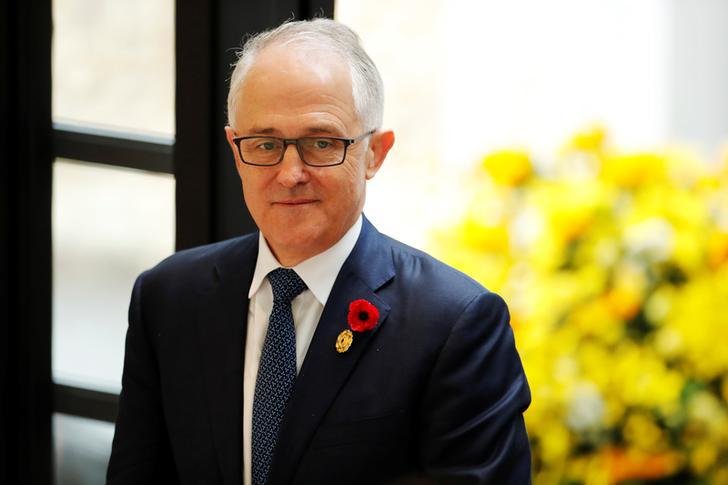Australia: Electoral Bill Will Stifle Public Debate
| Publisher | Human Rights Watch |
| Publication Date | 15 February 2018 |
| Cite as | Human Rights Watch, Australia: Electoral Bill Will Stifle Public Debate, 15 February 2018, available at: https://www.refworld.org/docid/5a8eb1f3a.html [accessed 5 June 2023] |
| Disclaimer | This is not a UNHCR publication. UNHCR is not responsible for, nor does it necessarily endorse, its content. Any views expressed are solely those of the author or publisher and do not necessarily reflect those of UNHCR, the United Nations or its Member States. |
Nonpartisan Groups Should Not Be Registered as 'Political Campaigners'
February 15, 2018 4:59PM EST
 Australia's Prime Minister Malcolm Turnbull attends the APEC Economic Leaders' Meeting in Danang, Vietnam on November 11, 2017. © 2017 Jorge Silva / Reuters
Australia's Prime Minister Malcolm Turnbull attends the APEC Economic Leaders' Meeting in Danang, Vietnam on November 11, 2017. © 2017 Jorge Silva / Reuters
(Sydney) – A proposed Australian law will limit social activist organizations from using foreign funding for advocacy purposes, Human Rights Watch said today in a submission to Australia's Joint Standing Committee on Electoral Matters. A committee hearing is scheduled for February 16, 2018, in Canberra.
The Electoral Legislation Amendment (Electoral Funding and Disclosure Reform) Bill 2017 is overly broad and infringes on basic rights, particularly the rights to freedom of speech, association, and expression and the implied right to political communication, Human Rights Watch said.
"Like an independent press, vigorous and outspoken nongovernmental organizations are essential to a rights-respecting democracy," said Elaine Pearson, Australia director. "Australia already has safeguards in place to restrict the political activity of registered charities and non-profit groups."
The proposed law requires organizations that spend a specified amount on "political purposes" to register as "political campaigners" and prohibits foreign funding to organizations for those purposes. "Political purpose" is defined very broadly to include the "public expression of views on an issue that is, or is likely to be, before electors in an election period (whether or not during an election period)."
The bill would chill legitimate advocacy work of nongovernmental organizations, impose onerous reporting requirements on them, and risk stigmatizing non-partisan groups by labeling them "political."
"Whether supported by foreign or local funds, groups should be able to comment on the issues of the day, which is not the same as promoting or opposing a political party or candidate," Pearson said.
Senator Mathias Cormann, Australia's finance minister, said that, "Reform is necessary to support the integrity of Australia's electoral system, and Australia's sovereignty, by ensuring that only those with a meaningful connection to Australia are able to influence Australian politics."
Restricting foreign donations to political parties or candidates, as well as to organizations that are campaigning for political parties or candidates, are valid legal changes that Australia might choose to make. Efforts by the Chinese Communist Party to influence politics in Australia have led the Australian government to take steps to counter foreign interference in Australian politics.
But the bill makes no distinction between these types of political activities, and advocacy on issues that may arise in an election. Rather than protecting Australia's democracy, the bill threatens to undermine it by curtailing freedom of speech, expression, and association.
The Australian government should abolish the requirement for nongovernmental organizations to register as "political campaigners" and limit application of this law to restrict foreign donations to political parties and candidates. Only organizations actively campaigning for or against political parties or candidates should be required to register as "political campaigners."
If Australia adopts these amendments, it will be following in the footsteps of repressive countries like Ethiopia, Russia, India, Hungary, and Egypt, all of which have taken steps to restrict foreign funding to nongovernmental groups, with devastating consequences for civil society and freedom of expression, Human Rights Watch said. The United States, United Kingdom, and Canada do not have such restrictions on foreign funding of groups that engage in advocacy.
"Restricting foreign funding to advocacy groups is a move straight out of the authoritarian's playbook," Pearson said. "Overly broad laws that restrict foreign funding have been used to intimidate and silence NGOs in Russia, Ethiopia, and elsewhere. Australia should not go down that path."
Link to original story on HRW website

